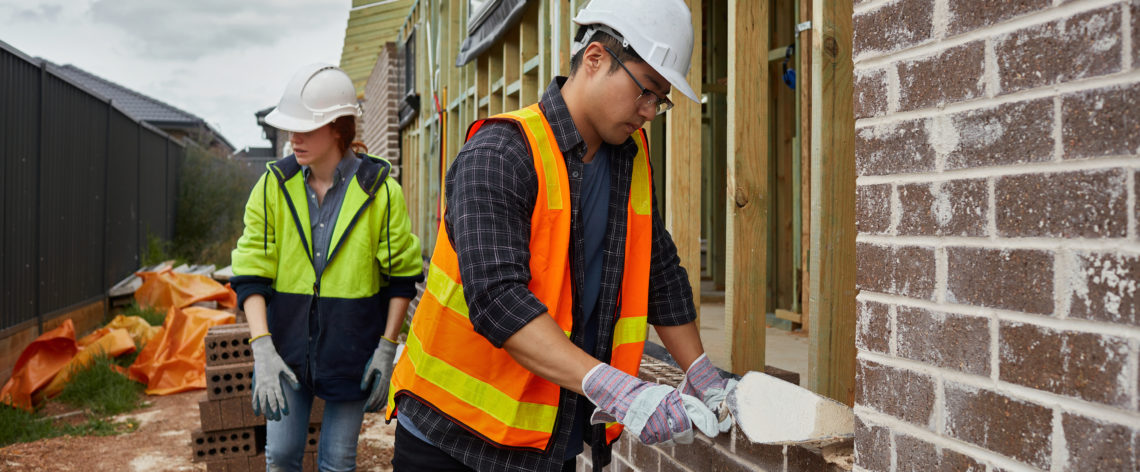Starting a new business means taking care of admin and planning tasks before you can lay your first row of bricks. The work you put into starting your bricklaying business helps give you the best shot at success. It helps ensure your business is set up correctly, meets legal requirements, is protected, and is ready to meet unexpected challenges.
Here’s a quick guide to starting a bricklaying business in Australia that covers:
- Drafting a business plan
- Basic tasks for setting up a business
- Bricklayer insurance options
- Sourcing tools, equipment, and materials
- Hiring employees
- Marketing your business
Write a business plan
Before you jump straight into running your business, you may want to lay some groundwork first. A business plan is a document that contains important information about your business, including:
- Your business goals
- Ideal customer profiles
- Local market research
- Research on competitors
- Budget for your first year
- Marketing plans
A business plan helps guide you through your first year in business (and sometimes beyond). The information collected in it could help you make crucial decisions and track your success. It may also be necessary to get a business loan or other funding.
Business basics
Once you’ve written a business plan, you’ll need to take care of some more admin. These steps help ensure your business is established correctly and operating legally.
- Choose a business structure – Sole proprietor, company, and partnership are popular choices for tradies. Each has pros and cons when it comes to running your bricklaying business and filing taxes. An accountant may be able to advise you on which structure to choose.
- Choose a business name – This is an important part of building a brand. Name ideas can be checked using online tools and trademarked to help protect them everywhere in Australia.
- Register for an ABN – An ABN (Australian Business Number) is required for filing business taxes, claiming GST, and taking advantage of business credits and other benefits.
- Apply for licenses and permits – Local councils or your state government may require you to have certain licenses or permits to work as a bricklayer.
Consider insurance
A lot can go wrong for small business owners, brickies included. Insurance for bricklayers is one way to lessen the risks that come with running your business. There are many types of bricklayer insurance available that you might consider, such as:
- Public Liability* – This cover is designed to provide protection in the event a customer, supplier or a member of the public brings a claim against you due to their being injured or sustaining property damage as a result of your negligent business activities.
- Business Insurance* – An insurance package designed to provide cover for your business contents, stock, tools and commercial premises when an insured event occurs. As a brickie, you may decide to include coverages like Portable Equipment, Business Interruption or Building & Contents in your package.
- Personal Accident & Illness* – This policy can cover your income and provide benefits for permanent disability and even death if you’re unable to work due to illness or injury.
Source equipment
Investing in quality tools and equipment is essential to running a successful bricklaying business. The tools you use will complement your skill but allow you to work with greater precision and efficiency. Choosing well-made tools (rather than cheap ones) could help you save money by avoiding frequent repairs and replacements.
Brickies should also organise suppliers for bricks, masonry, sand, cement, and other materials they’ll need for various jobs. You may want to negotiate discounts with preferred suppliers and line up backups to help avoid supply shortages and project delays.
Hire staff
Many bricklayers start their businesses on their own, but you may be in a position to hire employees to help with the work. Whether you are hiring full-time, part-time, or casual staff, it’s important to take the interview process seriously. A bad employee can reflect poorly on your business and create unneeded headaches for you.
You might also consider hiring people to help run the admin side of your business. An office admin could help you with scheduling jobs and responding to customers. A bookkeeper can help with invoicing, processing payments, and other accounting jobs. A marketing specialist may be able to run your advertising strategy, social media, and website. Hiring people on a freelance basis could be an affordable way to work with these and other business specialists.
Market your business
You won’t get far in business without customers! A solid marketing plan helps you reach your target customers and create a constant supply of work. Marketing plans typically use a variety of advertising and referral methods to spread the word about your bricklaying business:
- Word-of-mouth referrals
- Customer reviews
- Search engine optimisation (SEO)
- Social media ads
- Printed flyers
- Newspaper, radio and TV ads
- Billboards
- Sponsorships
Some types of advertising are more affordable than others, so you may need to get creative until your business is more established. For instance, many trade businesses stretch their marketing budget by running targeted social media ads designed to reach potential customers in their local area.
Building a strong foundation
A lot of work goes into starting a bricklaying business. But, if you do it well, you could create a strong foundation on which to build your career. As the demand for talented brickies continues, you’ll hopefully find great success with your small business!
Insurance for bricklayers is one way to protect the business you’re building. Public Liability Insurance has affordable insurance packages designed with tradie’s needs in mind. That way, if the worst happens, you won’t be left with expensive bills or risk losing your small business.
Visit our website to learn more about bricklayer insurance options and get your business protected today!
* This information is general only and does not take into account your objectives, financial situation or needs. It should not be relied upon as advice. As with any insurance, cover will be subject to the terms, conditions and exclusions contained in the policy wording.
© 2022 BizCover Pty Limited, Public Liability Australia is a business name of BizCover Pty Ltd (ABN 68 127 707 975; AFSL 501769)



